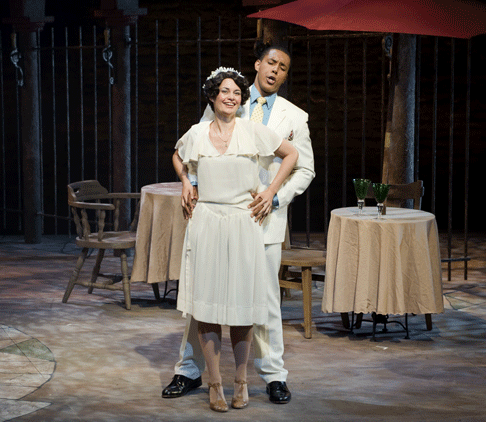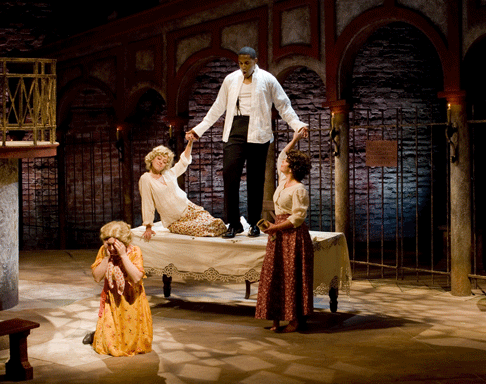06 Sep 2009
Aspen stages a Don to die for
“Can it be?”
“It can’t!”
“But it is; he looks just like him…”

“Can it be?”
“It can’t!”
“But it is; he looks just like him…”
A gasp went up when the curtain rose on Mozart‘s Don Giovanni in Aspen’s intimate Wheeler Opera House on August 21. Even at close range the Don — tall, lean, handsome and black — was a dead ringer for Barack Obama. It was, of course, not the president of the United States doubling as the legendary lover, but Donavan Singletary, a current member of the Lindemann Young Artist Development Program at the Metropolitan Opera, who played the Don. Although there is no knowing how adeptly Singletary, already the winner of numerous awards and competitions, might deal with health care, he is — it seems safe to say — the greatest Giovanni to come along since Italy’s Cesare Siepi brought new dimensions of sensuality to the character in the 1950’s.
In erudite notes for this final Aspen Opera Theater production of the 2009 60th anniversary season of the Aspen Music Festival, Edward Berkeley, director both of the program and of this production, discussed Giovanni as the Greek god Dionysus returned to earth. “He’s life force,” Berkeley wrote. “His sensuality and his sex drive has such energy that the rest of this society feels it doesn’t have it’s own energy without Giovanni.” Unable to equal him, however, the others, who are what they are only through their relationship with him, must destroy the Don in order to continue their own trivial lives. Even if he is hauled off to Hell at the end of the opera, there’s clearly more to the story that librettist Lorenzo Da Ponte assembled for Mozart than the Sunday-school tale of a destructive wrong-doer justly punished.
For in Giovanni the audience confronts what Robert A. Johnson in his book Ecstasy called “the irrational wisdom of the senses.” It’s heady stuff, and Berkeley staged one of the best Giovannis ever seen anywhere. To do so, he answered a question open to debate since the opera was new in Prague in 1788: just what had happened in Donna Anna’s room before the drama begins on stage? She was raped, the director says, and that leaves her with feelings of guilt for her father’s death at the Don’s hands and yet irrevocably attracted to the rapist. Anna, in short, knows a good thing when she has experienced it and she knows that Don Ottavio, the aristocratic Milquetoast whom she is to marry, is no match for the Don.
 A scene from Don Giovanni
A scene from Don Giovanni
This view brings a tension to the opera lacking in less perceptive stagings, and in Aspen Berkeley had a cast of talented young singers to make his production exceptional. Singletary, equally fluent in voice and body language; moved and sang with an elegance that made him carnality incarnate — a force the equal of a hurricane before which everyday mortals bow their heads.
Yet even more perfect in Aspen was his servant Leporello, portrayed with breathtaking immediacy by Adam Paul Lau, now a graduate student at Rice University. Too often reduced to a merely comic character, Lau understood the serious side of Leporello, his disgust with his master’s devious way and — at the same time — the desire to be like him. He really is the Don’s double.
Yoosun Park and Rachel Sliker were ideally paired as Anna and Elvira, two women unable to turn their backs totally on the attraction of the Don. Sliker played an Elvira ever willing to forgive with a nervous edge that hinted of hysteria, while as Anna Park had her heart set on revenge. Her account of what happened in that crucial night — incomplete as it might have been in detail — was not mere narrative; it was a flesh-and-blood reliving of that fateful hour.
In appearance Aspen’s Ottavio Samuel Read Levine recalled the youthful Jussi Bjoerling; however, his voice, still badly in need of refining discipline, was far more robust than that of the late Swede. As the Commandatore, bass Paul An struck cosmic fear in the hearts of everyone in the Cemetery and final Banquet scenes. Adrian Rosas was a delightfully boyish Mazetto, and it was only Debra Stanley, his Zerlina, who fell below the across-the-board excellence of the cast. Already vocally too mature to be a peasant girl convincing in her innocence, as an actress Stanley took no cues from her colleagues.
 A scene from Don Giovanni
A scene from Don Giovanni
As conductor, James Gaffigan, since 2006 associate conductor of the San Francisco Symphony, showed all the markings of a major Mozartean, working with an ensemble that richly displayed the gifts of many Aspen student instrumentalists. Sets by John Kasarda and largely non-descript modern costumes by Marina Reti were functional and, staying out of the way of the music, allowed an interrupted flow of Giovanni’s many scenes. Most significant, however, was Berkeley’s telling of the story of this opera. Rather than answering all the questions about Giovanni, he confronted the audience with the fact that great art dwells in that abyss that lies between human aspiration and achievement. For Giovanni — not unlike his brothers Faust and Tristan — is a man out to know life to its fullest — usually, alas, at the expense of women. As ever-hungry and never-sated Dionysian man, the Don is shattered by the wall of limitations placed in his way by this thing called “reality.” Giovanni pays the price demanded by his many acts of hubris — and one regrets that that is the way things are in this world.
While the Aspen Opera Theater might be regarded primarily as a training program, it is much more than that. Indeed, this production exceeded by far the expectations that one brings to the country’s regional companies and, this — in turn — should prompt them to rethink the role they are too often content to play with yet another run-of-the-mill Carmen or Butterfly.
Finally, as the world this summer celebrates Marian Anderson’s historic 1939 concert at Lincoln Memorial one cheers the Aspen performance in which the first four people to appear on stage were one black and three Asians.
Wes Blomster